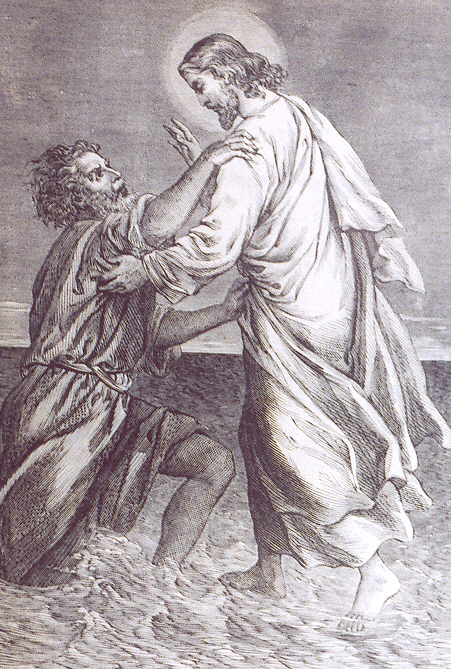
Return to
Index The Catholic Faith
Return
to Level One Topic Index
Home Page
We know that Christ taught people about the Heavenly Father who loved them and offered them the way to eternal life. But there was another part of Christ's teaching. It was so unusual, and so surprising, that Jesus did not even tell people about it at first. He only gave them hints of it now and then. And sometimes, when people found out, Jesus would tell them not to tell anyone else.
What was this mysterious news that Jesus only let out little by little? It was the truth that Jesus Christ was the son of God, both human and divine. The Jews were not at all ready for this truth. They thought the Messiah would be a man, a descendant of David who would restore the kingdom of Israel. They also thought the Messiah would be a holy leader who would show them how to become closer to God. But God's Son? The idea of a man claiming to be God sounded like blasphemy, a sin against the Second Commandment. So you can see why Jesus had to be patient and careful about telling the people who he really is.
The first hints Jesus gave of his divinity were his miracles. With a word or a touch, he healed people of blindness, leprosy, and many other diseases. On two occasions he multiplied bread to feed thousands of people. Since no prophet had ever done these things, people could see that Jesus shared God's power in a special way. Jesus could also heal people who were possessed by devils. (When someone is "possessed" the devil controls his speech and actions so completely that the person has no power to stop it.) The Gospels tell us that these devils knew who Jesus was, but that Jesus ordered them to keep silent. The time had not yet come for a clear statement of Christ's divinity, and the devil was not the right one to make such a statement.

Jesus allowed his apostles to learn the truth sooner. They saw him stop a storm with a single command, and they wondered, "who is this, that even the wind and sea obey him?" (Lk 8:24-25). At another time, the apostles were again caught in a storm on the lake, but Jesus was not with them. Late at night, they were astonished to see Jesus walking across the water toward them. Peter asked if he might come to Jesus across the water, so Jesus said, "Come." Peter was able to walk on the water until he grew afraid: then he sank. Jesus pulled Peter back up and took him to the boat. The other apostles, says the Gospel, "worshipped him and said, 'Truly you are the Son of God.'" (Mt 14:33).
Later, Jesus asked the apostles, "Who do men say that I am?" They reported what people were saying: that Jesus was Elijah or one of the prophets come back to earth; perhaps John the Baptist. Then Jesus asked, "But who do you say that I am?" Peter replied, "You are the Christ, the Son of the Living God," Jesus told Peter he was correct: "Flesh and blood have not revealed this to you, but my Father in Heaven." But still Jesus told the apostles not to tell anyone else that he was God's Son. (Mt 16:13-20).
Even with this new knowledge of Jesus' true identity, it must have been hard for the apostles to understand. After all, Jesus looked so ordinary. When God visited his people in the Scriptures, there were always signs of his glory and power such as fiery clouds, thunder, or brilliant light. Jesus had kept his glory hidden, but one day, he revealed it to Peter, James, and John. He took them up a mountain,
and was transfigured before them. His face shone as the sun, and his garments became white as snow. And behold, there appeared Moses and Elijah talking together with him... A bright cloud overshadowed them, and a voice came out of the cloud saying, "This is my beloved Son, in whom I am well pleased; hear him." (Mt 17:1-5).
When the vision ended, Jesus again looked as he always did. He told the three apostles to tell no one what had happened until after the Resurrection.
The time finally came for Jesus to proclaim his divinity to the people more openly. Once in the Temple of Jerusalem, Jesus said, "before Abraham was, I am." Many were horrified and picked up stones to throw at Jesus. Not only did he claim to have lived before Abraham, but he took as his own the sacred Name of God, "I AM", that had been revealed to Moses. Those who hated Jesus considered this a crime. They plotted to kill him.
The poor and simple people of Jerusalem were more ready to believe. Jesus cured a blind man and later asked him. "Do you believe in the Son of God?" "Who is he, Lord," replied the man, "that I may believe in him?" "You have seen him", said Jesus. "It is he who now speaks to you." And the man fell to his knees to worship Jesus. (Jn 9:35-38).
Jesus showed his divine power again when he raised Lazarus from the dead. "I am the Resurrection and the life", said Jesus. The people knew that God would not give such wonderful powers to Jesus if he was telling a lie about being God's Son.
The greatest proof of Jesus' divinity would be his Resurrection from the dead. But that was yet to come.
Used with the permission of The Ignatius Press 800-799-5534
Return to Index The Catholic Faith
Return
to Level One Topic Index
Top
Home Page